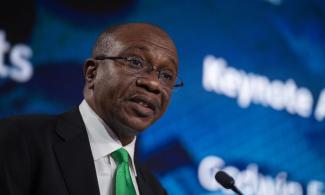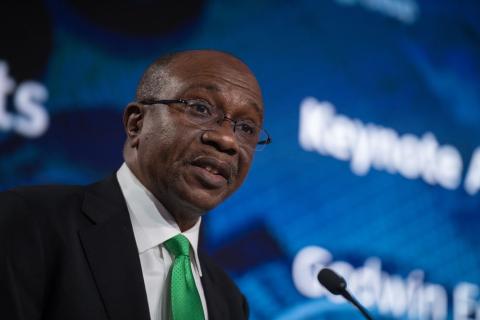
Governor of the CBN, Godwin Emefiele, said the charges on savings and withdrawals above N500,000 will only affect about five per cent bank users.

The Central Bank of Nigeria has refuted claims that the new policy of fees being charged on deposits and withdrawals on savings account would affect the majority of Nigerians.
Governor of the CBN, Godwin Emefiele, said the charges on savings and withdrawals above N500,000 will only affect about five per cent bank users.
Emefiele made this clarification while addressing journalists in Abuja on Friday.
In the new policy, the apex bank had said it would impose a 2% charge on deposit of withdrawal of excess limit of N500,000.
For corporate accounts, the apex bank said that Deposit Money Banks would charge five per cent processing fees on withdrawals and three processing fee on lodgements of amounts above N3m.
The House of Representatives had on Thursday through a resolution directed the apex bank to suspend the policy.
But responding to the development, Emefiele said if the Nigerian economy was to compete effectively with those of developed countries, a payment system that encourages the use of non-cash channels was desirable.
He said that before the cashless policy was first inaugurated in 2012, a lot of stakeholder engagements were done to sensitise Nigerians on its benefits.
He said the policy was suspended in 2014 to allow more payment channels to be developed by Deposit Money Banks.
Emefiele said that since the policy was suspended, currency management cost had continued to increase year-on-year at an average annual growth rate of 33 per cent.
However, he said the bank had continued to provide alternative channels, adding that people had embraced it.
He said Point of Sale transactions had moved from N48bn in 2012 to N2.2trn while electronic transfer had moved from N3.8trn in 2012 to N80.46trn in 2018.
Emefiele said, “Since the policy was first launched, currency management costs have continued to increase year-on-year at an average annual growth rate of 33 per cent.
“Notwithstanding, electronic transactions have increased within the economy. We have provided alternative channels and people have embraced it.
“This is a strategic timing of these actions because on Monday, September 23, the mutual evaluation by GIABA (Inter-governmental Action Group Against Money Laundering in West Africa) on the country’s anti-money laundry and CFT (Combating Financing of Terrorism) regime will begin.
“GIABA will be in Nigeria to access the rate at which the country has embraced anti-money laundry and CFT regime. It is important that we display and show to them that Nigeria is indeed in conformity with their practices as enshrined in their anti-money laundry and CFA laws.”
The apex bank boss said if the CBN did not implement the cashless policy, credit cards owned by Nigerians might not be used abroad.
On the Value Added Tax, he said the MPC supported the decision of the Federal Government to increase the rate from five per cent to 7.5 per cent.
He said with Nigeria having one of the lowest VAT rate in the world, and faced with fiscal challenge, the best way to shore up revenue was to increase tax.
He added, “The MPC endorsed the increase in the VAT rate from five per cent to 7.5 per cent. The government has the responsibility to fend for everybody.
“Fending for everybody means that it has to spend money to provide infrastructure – roads, airports, different things that will improve the lives of its people.
“There are two ways through which government can fund these expenditures. It’s either it raises revenue or goes for debt. You all know that the government has been criticised that the debt stock is too high.
“You all know that government debt service ratios are too high. What that means is that your revenue is small because if your revenue is large, then your debt service ratios will be lower.
“If we say government should not borrow; then, government must raise revenue. If government must raise revenue and we think this is one way government can raise revenue to meet its obligation.”
Emefiele said while the decision to increase VAT might be painful to Nigerians, the benefit of such move far outweighed the cost.